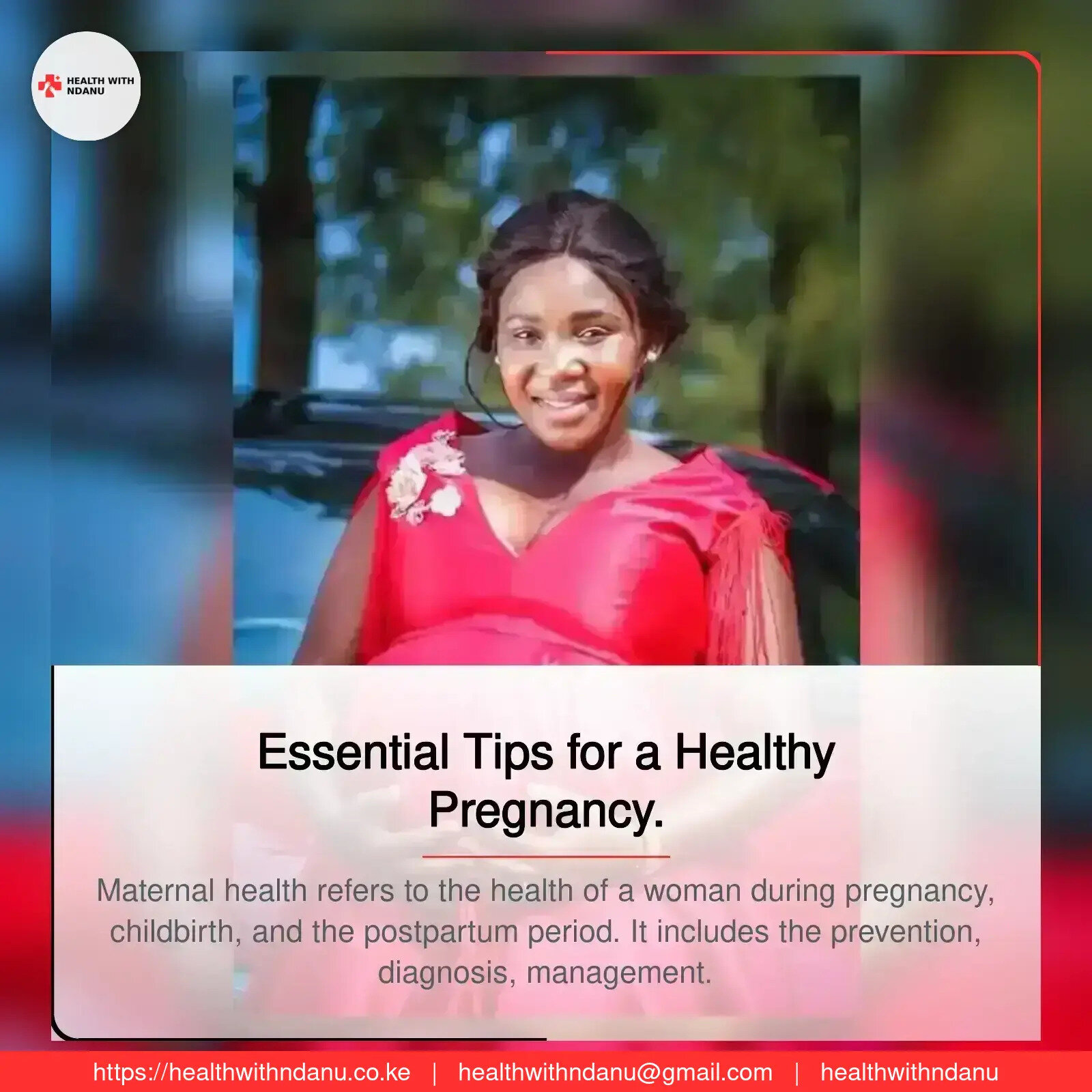Essential Tips for a Healthy Pregnancy.



Introduction
Maternal and prenatal health are critical aspects of a woman’s overall well-being and essential for ensuring the health of both the mother and the baby. From conception to delivery, the journey of pregnancy is marked by physical, emotional, and lifestyle changes that require careful management
What Is Maternal and Prenatal Health?
- Maternal health refers to the health of a woman during pregnancy, childbirth, and the postpartum period. It includes the prevention, diagnosis, and management of health issues that may arise during this time.
- Prenatal health, a subset of maternal health, focuses on the care provided during pregnancy to ensure the well-being of both the mother and the developing baby. Proper prenatal care is essential to identify and address potential complications early, ensuring a positive outcome for both mother and child.
The Importance of Maternal and Prenatal Health
1. Reduced Risk of Complications
Regular prenatal check-ups help monitor the health of the mother and baby, reducing the risk of complications like preeclampsia, gestational diabetes, or preterm labor.
2. Healthy Fetal Development
Proper maternal nutrition and care promote healthy fetal growth, reducing the likelihood of low birth weight or congenital disabilities.
3. Emotional and Mental Well-being
Prenatal care includes mental health support, addressing issues like prenatal depression and anxiety to ensure a balanced emotional state during pregnancy.
4. Education and Preparation
Expectant mothers receive guidance on labor, delivery, and newborn care, empowering them to make informed decisions throughout their pregnancy journey.
Key Components of Prenatal Care
1. Regular Prenatal Visits
Routine check-ups are the cornerstone of prenatal care. These visits typically involve:
- Monitoring blood pressure and weight.
- Checking fetal growth and heartbeat.
- Conducting necessary screenings and ultrasounds.
2. Nutrition During Pregnancy
Proper nutrition is crucial for both mother and baby. Focus on:
- Folic Acid: Prevents neural tube defects. Found in leafy greens, fortified cereals, and legumes.
- Iron: Supports red blood cell production. Found in red meat, beans, and spinach.
- Calcium and Vitamin D: Promote bone health for mother and baby. Found in dairy products, fortified orange juice, and fish.
3. Prenatal Vitamins
Taking prenatal vitamins ensures that the mother receives essential nutrients that may be lacking in her diet.
4. Healthy Lifestyle Habits
Avoid smoking, alcohol, and recreational drugs to reduce the risk of complications.
Engage in moderate exercise, such as walking or prenatal yoga, to maintain physical fitness.
5. Mental Health Support
Pregnancy can be emotionally challenging. Seek counseling or support groups if experiencing stress, anxiety, or depression.
Common Pregnancy Complications and How to Manage Them
1. Gestational Diabetes
Regular monitoring and a balanced diet can help manage blood sugar levels.
Consult with a healthcare provider for personalized advice.
2. Preeclampsia
Marked by high blood pressure and protein in the urine, preeclampsia requires close monitoring and medical intervention.
3. Preterm Labor
Stay vigilant about symptoms like regular contractions or fluid leakage before 37 weeks. Seek immediate medical attention.
4. Morning Sickness
Small, frequent meals and ginger tea can help alleviate nausea.
Tips for a Healthy Pregnancy
1. Stay Hydrated
Drink at least 8–10 glasses of water daily to maintain amniotic fluid levels and overall hydration.
2. Eat Balanced Meals
Incorporate a variety of fruits, vegetables, whole grains, and lean proteins into your diet.
3. Get Plenty of Rest
Sleep is crucial for maternal health. Aim for 7–9 hours of sleep per night. Use supportive pillows to enhance comfort.
4. Exercise Safely
Light to moderate exercises, such as swimming, walking, and prenatal yoga, improve circulation and reduce pregnancy-related discomforts.
5. Educate Yourself
Attend prenatal classes to learn about childbirth, breastfeeding, and newborn care.
6. Maintain Open Communication with Healthcare Providers
Share any concerns or symptoms with your doctor or midwife to address potential issues promptly.
Postnatal Health: The Fourth Trimester
Maternal care doesn’t end with childbirth. The postpartum period, often called the "fourth trimester," is just as important for recovery and well-being.
1. Physical Recovery
Follow up with healthcare providers to monitor recovery from childbirth.
Eat nutrient-rich foods to replenish energy levels.
2. Breastfeeding Support
Seek advice from lactation consultants if experiencing difficulties.
3. Mental Health
Postpartum depression is common and treatable. Reach out for help if needed.
Overcoming Barriers to Maternal and Prenatal Health
1. Accessibility
In rural or underserved areas, access to healthcare can be limited. Solutions include:
Expanding telemedicine options.
Training community health workers to provide basic prenatal care.
2. Cost
The cost of prenatal care can be prohibitive for some families. Governments and organizations should promote free or subsidized maternal health programs.
3. Cultural Sensitivity
Healthcare providers should respect cultural differences and offer care that aligns with the beliefs and preferences of expectant mothers.
Conclusion
Maternal and prenatal health are vital for ensuring a healthy pregnancy and a positive childbirth experience. By prioritizing regular check-ups, proper nutrition, mental health support, and a healthy lifestyle, mothers can significantly improve outcomes for themselves and their babies.
Governments, healthcare providers, and communities must work together to address barriers to maternal care, ensuring that every woman has access to the resources and support she needs.
Got Your Own Experience? Share with us
Popular Categories
Mablogu Zinazobambwa Sana
Daily Newsletter
Get all the top stories from Blogs to keep track.



